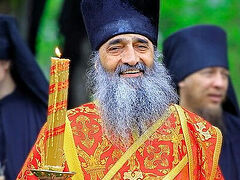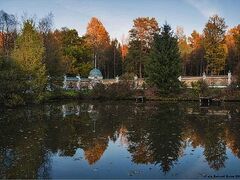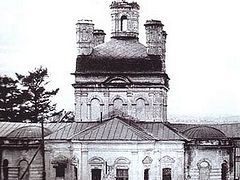Translator’s introduction:
Fr. Iliodor began his monastic life under obedience to the beloved Elder Kirill (Pavlov) at the Holy Trinity-St. Sergius Lavra in 1985. In 1989, he moved to Optina under obedience to the Elder and St. Sergius himself, and subsequently labored there for thirty-one years—almost from the very time of its reopening. He witnessed the rebirth of the monastery and the flowering of its spiritual life over the past three decades, and he personally witnessed the thousands of pilgrims who arrived over the years, tasked with the obedience of receiving them. And in those few minutes, he showed them the same love as if they were family.
He was a brother-monk to the three Optina martyrs who were slain on Pascha of 1993, and since then, he could often be found in their burial chapel. He was a constant traveling companion of Elder Iliy (Nozdrin), the confessor to the Patriarch and the most revered elder in Russia today. “Constant communication with him and frequent concelebration with Fr. Iliy made it so that Fr. Iliodor adopted and, ultimately, reflected in himself the best features of this Godly-wise elder— love with a capital L, and prayer with a capital P,” the monastery writes of him.
“If you tried to list all his virtues, it would be like trying to cross the sea without a boat.”
Fr. Iliodor was lovingly known as the “Voice of Optina.” “His magnificent voice, musical talent, and, most importantly, his truly angelic zeal for the Divine Liturgy were a magnificent adornment of the Divine service of the Optina Hermitage.”
In addition to celebrating the services as a deacon, he loved to gather the faithful to chant Akathists, wherever and whenever he could. It was a special treat for pilgrims to be present at one of his Akathists, which he always sang with his whole heart. He was also particularly fond of the hymn, “Rejoice, O Unwedded Bride.”
We are pleased to acquaint our readers with the views and sayings of this inimitable hierodeacon of Optina, who has so recently departed to the Lord.
* * *
“Rejoice, O good Gatekeeper, who openest the portal of paradise unto the faithful!”1—who doesn’t remember his resounding melodies? Even the worst of singers would sing when with him. And then, long after the Akathists that Fr. Iliodor started everywhere, the soul would sing and rejoice.
He was an apostle of this main human happiness, so joyful, ringing with this Gospel—to be with God under the protection of the Most Holy Theotokos. And the Mother of God led him into the Heavenly abodes on the feast of the Iveron Gatekeeper. And his fortieth day will fall on the Entrance of the Most Holy Theotokos Into the Temple—Optina’s patronal feast.
Fr. Iliodor bequeathed to us: “Everyone must absolutely use the time the Lord allots to each person: twenty-four hours a day!” Including on vacation. We here publish his words, recorded one day over a cup of tea.
When is a person doing well?
 Fr. Iliodor. Photo: Alexey Loven Often a man searches for himself a long time. That’s how I wandered through life until the age of forty, poking around here and there. Then the Lord brought me to the Lavra and I understood everything! And once you understand, it’s all systems go! So I became a monk, and I stayed there, in the monastery. I started to pray, properly. And this is where the secrets and wisdom of our existence and relationship with God began to be revealed. Our whole life is in the hands of God. Building a relationship with God is the only thing we need. All the rest will be added (cf. Mt. 6:33).
Fr. Iliodor. Photo: Alexey Loven Often a man searches for himself a long time. That’s how I wandered through life until the age of forty, poking around here and there. Then the Lord brought me to the Lavra and I understood everything! And once you understand, it’s all systems go! So I became a monk, and I stayed there, in the monastery. I started to pray, properly. And this is where the secrets and wisdom of our existence and relationship with God began to be revealed. Our whole life is in the hands of God. Building a relationship with God is the only thing we need. All the rest will be added (cf. Mt. 6:33).
Above smart is reasonable, above reasonable is wise, above wise is Divinely-wise, and above Divinely-wise is holy simplicity. But that’s flying high. Everything is simple with God. “Where there is simplicity, there are a hundred angels, but where there is cleverness, there are none,” as our Batiushka Ambrose of Optina said. We are the ones who make things difficult for ourselves. “God doesn’t create a man’s cross for him. And no matter how heavy the cross is that some people carry in life, the tree from which it’s made always grows in the soil of his heart,” he would teach, pointing to his heart and adding: “The tree is at the source of the waters, and the waters are seething there”—that is, the passions. This is what causes all our troubles.
And what is holiness? Outwardly, its people who are modest, simple, kind, accessible, direct, benevolent, and gentle. If someone doesn’t get angry at anyone else, that’s already considered holiness—if he doesn’t judge or condemn anyone. “To live is to not grieve, to not condemn anyone, to not annoy anyone, and my respect to everyone”—who doesn’t know these words of Batiushka Ambrose? Seek neither honor nor glory for yourself. And be lenient and attentive to everyone, love everyone. Just start doing this, and you will have peace in your soul. If there is no love in you, then do the works of love, although without love, and God, seeing your desire and suffering, will give love to your heart, as the Optina Elders teach.
After all, when is a person doing well? Not when he is loved, but when he himself loves. Then everything is good for him: The weather is lovely, and the people all around are all so wonderful. But when he doesn’t love, everything goes wrong; everything is difficult and unbearable. The Lord therefore gives the commandment: Love one another (Jn. 13:34).
Nothing makes sense without love
They say the world will perish when love dries up. There’s no way without love. Why will the world collapse? Because nothing makes sense without love. If there’s no love, then many disasters might have to begin to bring people to their senses at least a little bit. Everything is in the hands of God. There were prophecies, but if the people repented, the Lord changed His mind. If there had been ten righteous people in Sodom and Gomorrah, at least five who repented in each city, then God wouldn’t have destroyed these cities (Gen. 18:32)!
We must all make sure to use the time that the Lord allots to each person—twenty-four hours a day! The same amount is given both to the Patriarch and to everyone. However you use it, that’s how it will be. As the people say, every man builds his own happiness and misery. Don’t let your circumstances rule you, but you rule your circumstances. Or else you’ll start saying: “It’s a habit—it’s second nature;” or blame it on your wife: “My wife is a fool…” These are all excuses.
A man has three main responsibilities: If he is married he is responsible to his family; then to his work—a man can’t do without work. Women have their own troubles—children, the home. And his other responsibility is to the Church. That is, the Church should be our priority. When God is in first place, everything else finds its place. But you have to mature for this first. The family falls out of sight for many: “He just works and works and we don’t see him at home”—constantly from all sides. Who needs such a life?
We have to rest, because by His own example, the Lord commanded and sanctified not only six days of labor, but also the seventh day of rest (St. Nikolai Velimirović wrote about this very well). We have to fulfill the commandments. But rest is also not an end in itself as some think. There are a lot of distortions now, whether workaholism, or wasting your life away. It’s all nonsense. Because if life has no love, it is truly deprived of any sense.
What can we demand of non-Church people? They don’t understand the meaning of life. But when a Christian drifts away from the Church—that’s trouble. And that servant, which knew his lord's will, and prepared not himself, neither did according to his will, shall be beaten with many stripes (Lk. 12:47). And what they won’t say to justify themselves: “Well, we couldn’t have done it then;” “It’s not a big deal that we’re running late… The Lord will forgive.” And then come sicknesses and sorrows.
Live so as to prepare for eternity
“In your sorrows, pray to God, and they will pass away; but you won’t drive away sicknesses with a stick,” said St. Ambrose. Healing is often given to strengthen faith. I know a woman named Nadezhda. She’s from Finland. She got sick with sarcoma. The doctors gave her a month or two to live. She sold everything she had and went to visit holy places. She prayed at relics, venerated wonderworking icons, and began to live a Christian life, to help others, to confess, to commune, to receive Unction. Then after Unction, she made sure to use the oil to anoint herself daily, along with other oils consecrated on the relics of the saints and on icons. She drank holy water, she started every day with prosphora, and she bathed in holy springs. She became a believer. She was no longer skeptical about what it was all for. The doctors couldn’t believe it:
“Where are you being treated?”
“I have some holy oil, holy water, prosphoras,” she answered directly.
“Really?! Well…,” the doctors said, exchanging glances.
But she lived another twelve years! And that dozen more years given to her were enough to prepare for eternity. She left this world very simply and easily. To be saved, St. Ambrose said, is not difficult, but wise. It’s worse when diseases are sent to those who already believe.
To be continued.




